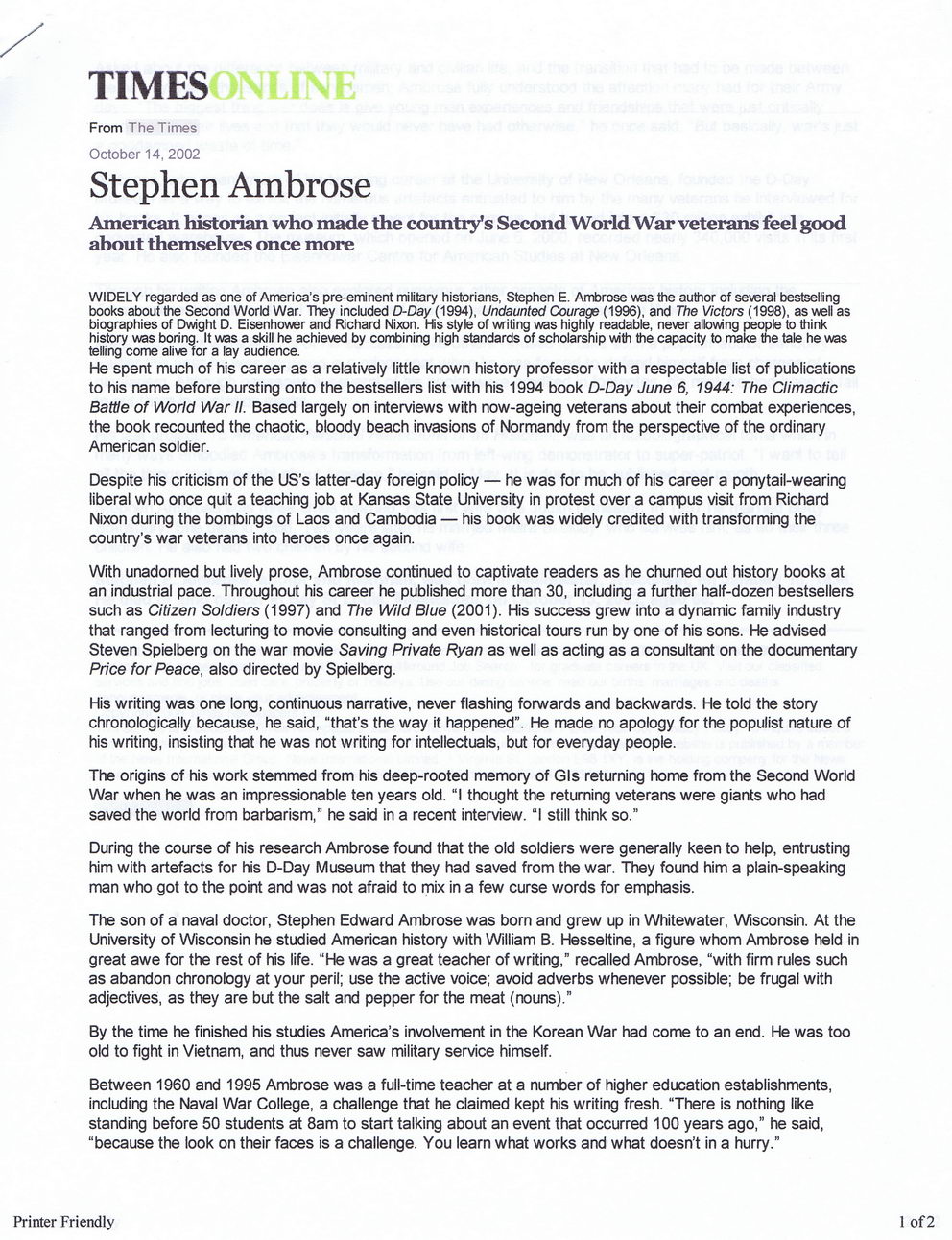This text was obtained via automated optical character recognition.
It has not been edited and may therefore contain several errors.
/ TIMES From The Times October 14, 2002 Stephen Ambrose American historian who made the country?s Second World War veterans feel good about themselves once more WIDELY regarded as one of America?s pre-eminent military historians, Stephen E. Ambrose was the author of several bestselling books about the Second World War. They included D-Day (1994), Undaunted Courage (1996), and The Victors (1998), as well as biographies of Dwight D. Eisenhower and Richard Nixon. His style of writing was highly readable, never allowing people to think history was boring. It was a skill he achieved by combining high standards of scholarship with the capacity to make the tale he was telling come alive for a lay audience. He spent much of his career as a relatively little known history professor with a respectable list of publications to his name before bursting onto the bestsellers list with his 1994 book D-Day June 6, 1944: The Climactic Battle of World War II. Based largely on interviews with now-ageing veterans about their combat experiences, the book recounted the chaotic, bloody beach invasions of Normandy from the perspective of the ordinary American soldier. Despite his criticism of the US?s latter-day foreign policy ? he was for much of his career a ponytail-wearing liberal who once quit a teaching job at Kansas State University in protest over a campus visit from Richard Nixon during the bombings of Laos and Cambodia ? his book was widely credited with transforming the country?s war veterans into heroes once again. With unadorned but lively prose, Ambrose continued to captivate readers as he churned out history books at an industrial pace. Throughout his career he published more than 30, including a further half-dozen bestsellers such as Citizen Soldiers (1997) and The Wild Blue (2001). His success grew into a dynamic family industry that ranged from lecturing to movie consulting and even historical tours run by one of his sons. He advised Steven Spielberg on the war movie Saving Private Ryan as well as acting as a consultant on the documentary Price for Peace, also directed by Spielberg. His writing was one long, continuous narrative, never flashing forwards and backwards. He told the story chronologically because, he said, ?that?s the way it happened?. He made no apology for the populist nature of his writing, insisting that he was not writing for intellectuals, but for everyday people. The origins of his work stemmed from his deep-rooted memory of GIs returning home from the Second World War when he was an impressionable ten years old. ?I thought the returning veterans were giants who had saved the world from barbarism,? he said in a recent interview. ?I still think so.? During the course of his research Ambrose found that the old soldiers were generally keen to help, entrusting him with artefacts for his D-Day Museum that they had saved from the war. They found him a plain-speaking man who got to the point and was not afraid to mix in a few curse words for emphasis. The son of a naval doctor, Stephen Edward Ambrose was born and grew up in Whitewater, Wisconsin. At the University of Wisconsin he studied American history with William B. Hesseltine, a figure whom Ambrose held in great awe for the rest of his life. ?He was a great teacher of writing,? recalled Ambrose, ?with firm rules such as abandon chronology at your peril; use the active voice; avoid adverbs whenever possible; be frugal with adjectives, as they are but the salt and pepper for the meat (nouns).? By the time he finished his studies America?s involvement in the Korean War had come to an end. He was too old to fight in Vietnam, and thus never saw military service himself. Between 1960 and 1995 Ambrose was a full-time teacher at a number of higher education establishments, including the Naval War College, a challenge that he claimed kept his writing fresh. ?There is nothing like standing before 50 students at 8am to start talking about an event that occurred 100 years ago,? he said, ?because the look on their faces is a challenge. You learn what works and what doesn?t in a hurry.? Printer Friendly 1 of 2

Ambrose, Stephen Times-Online-2002-1